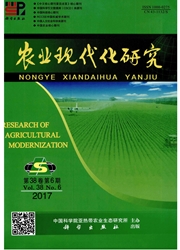

 中文摘要:
中文摘要:
对我国粮食直接补贴效率的研究,不仅要考虑政策实施效果,也需兼顾政策履行成本,这样补贴政策才具有可操作性和持续性。本文利用较标准的研究效率问题的数据包络分析法,从“制度效率”和“规模效率”两方面来研究补贴效率,分析结果表明:①我国粮食补贴制度效率普遍不高;②各省市补贴制度效率存在较大差距;(3)补贴无效率的区域多集中在粮食主产区;(4)补贴无效率的区域多呈规模效益递减,制度创新尤为重要。根据这些基本结论,提出一些重要政策启示。
 英文摘要:
英文摘要:
To research grain direct subsidy efficiency, it not only must consider the policy implementation effect, but also must give dual attention to the policy cost, then the policy has the feasibility and the endurance. This article uses the DEA model which is a standard method of efficiency research, and studies the subsidy efficiency from "the system efficiency" and "the scale efficiency", the analysis result indicated: (1)Chinese grain subsidy system efficiency is not generally high; (2)various provinces and cities/ subsidy efficiencies exist the big disparity; (3)no efficiency regions concentrate in the grain main producing area; (4)no efficiency regions usually have the scale benefit to decrease, and the system innovation especially is important. According to these basic conclusions, the author obtains some major policy enlightenment.
 同期刊论文项目
同期刊论文项目
 同项目期刊论文
同项目期刊论文
 期刊信息
期刊信息
